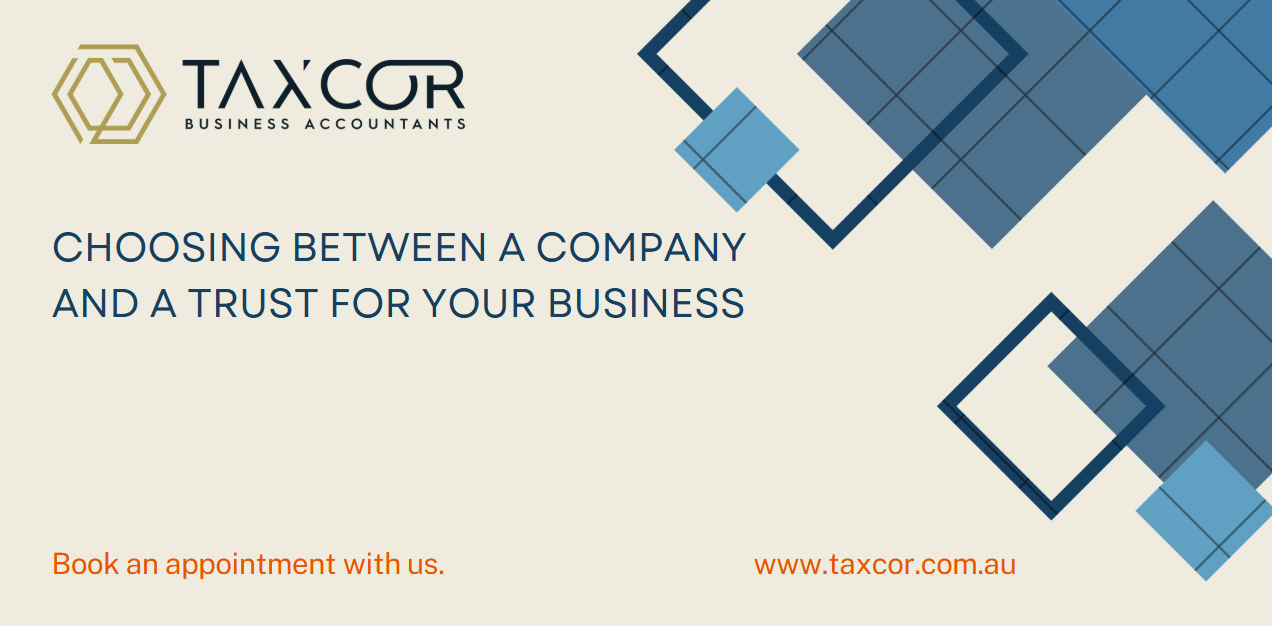Choosing Between a Company and a Trust for Your Business: What You Need to Know

When starting or growing a business, choosing the right structure is one of the most important decisions you will make. Two of the most common structures used in Australia are discretionary trusts and companies. Each comes with its own set of advantages and disadvantages, and the right choice will depend on your goals, risk profile, funding needs, and long-term plans.
Understanding the Key Differences
Companies, provide a more straightforward and structured approach. They are taxed at a lower flat rate, profits can be retained in the company to fund future growth, and they make it easier to introduce new investors or sell the business. However, companies may have fewer tax concessions available compared to trusts, particularly for capital gains.
Discretionary Trusts, on the other hand, offer flexibility when it comes to distributing income and capital to beneficiaries. They are often used for family businesses and can provide strong asset protection. However, they also come with obligations, such as the requirement to distribute income annually, and are subject to increasing scrutiny from tax authorities.
When a Company Might Be Suitable
Using a company to run your business might be better if:
- You want to retain profits in the business to fund growth.
- You are seeking third-party investors or planning to raise capital.
- You prefer a clearer and simpler structure.
- You want to limit ongoing tax planning complexity.
In particular, having a company operate the business with a discretionary trust as the shareholder allows a balance between commercial benefits and family wealth planning. This setup provides the flexibility of income distribution with fewer direct tax complications. It also enhances asset protection and succession planning options.
When a Trust Might Be More Effective
A discretionary trust could be the right choice if:
- You want to distribute income flexibly among family members.
- Asset protection is a priority.
- You plan to access certain tax concessions available to trusts.
- Your business generates regular profits that you want to distribute.
It is worth noting that using a trust with a corporate beneficiary (to cap tax at the company rate) has become more complex. Retaining those funds in the trust for business use can now trigger tax issues unless specific arrangements are followed. This adds an administrative burden and cash flow consideration for businesses.
A Holding Company: An Advanced Option
For growing businesses with more complex needs, introducing a holding company structure can add another layer of flexibility and protection. In this setup, the operating company is owned by a holding company, which in turn is owned by a discretionary trust. This structure:
- Provides strong asset protection by separating business risks from retained profits.
- Allows better management of funds between group companies.
- Enhances flexibility for future sale, succession, or expansion.
- Reduces exposure to tax complications from loans or distributions within the group.
Planning for the Long Term
It is important not to choose a structure based only on short-term tax savings. The right structure should support:
- Business growth and funding strategies.
- Risk management and asset protection.
- Succession planning for children or other family members.
- Future sale of the business or exit strategies.
If you are considering restructuring your existing business, there are pathways available to move from a trust to a company structure (or vice versa) without triggering immediate tax costs. However, these must be carefully planned to avoid unexpected tax or legal consequences.
There is no one-size-fits-all answer when it comes to choosing between a trust and a company. Your decision should be based on your business goals, family situation, and plans for the future. Given the continuous changes in how trusts are viewed and taxed, it is now more important than ever to seek professional advice before making a decision.
In addition, Personal Services Income (PSI) refers to income that is mainly a reward for an individual’s personal efforts or skills. PSI rules may limit the deductions you can claim and require the income to be attributed directly to the individual performing the work, regardless of the business structure used. If your offering Professional Services, such as an IT specialist, you will be subject to additional rules and regulations, and this article may not be applicable to you.
If you would like help assessing which structure is right for your business, please contact us today for an obligation free consultation.
